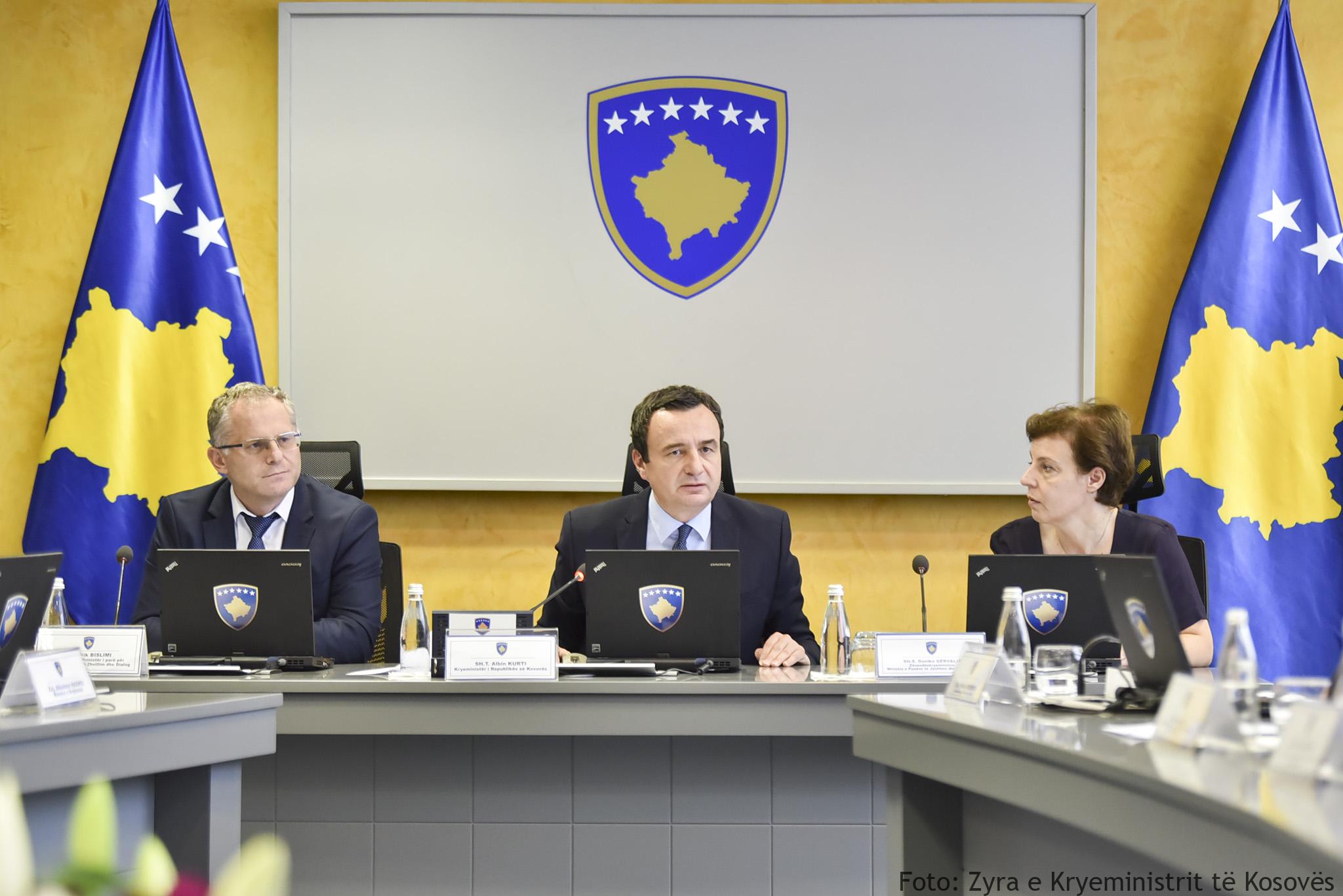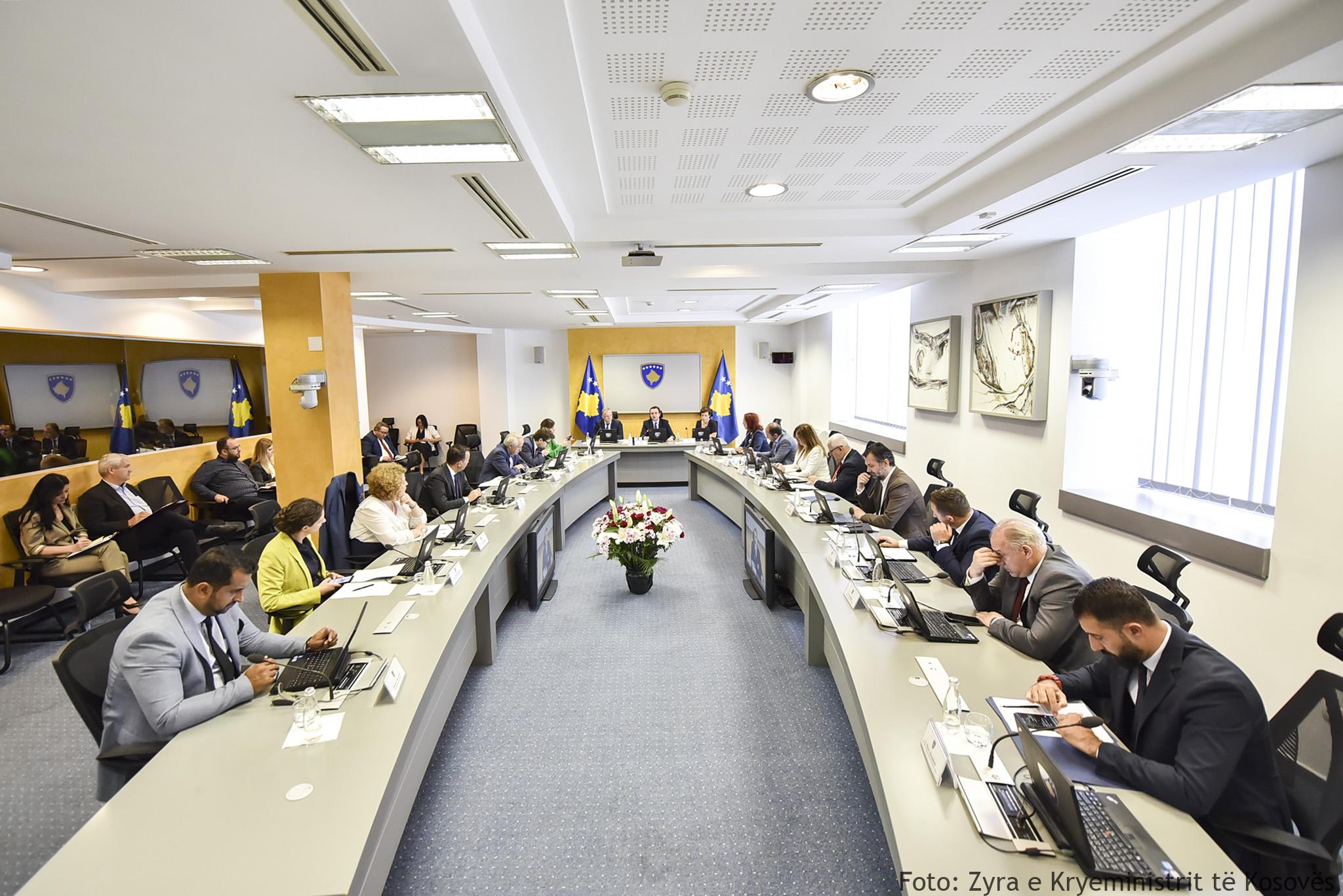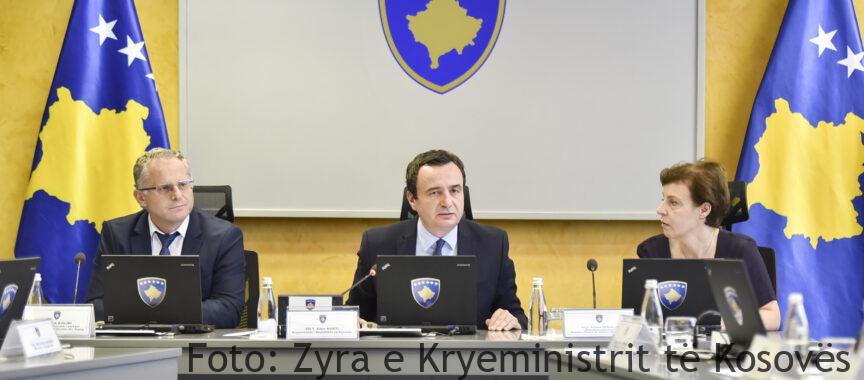Prishtina, 24 August 2022
Dear Deputy Prime Ministers and Ministers,
Today marks the Independence Day of Ukraine, and exactly on this day six months ago, the unprovoked and unjustified aggression of the Russian Federation in Ukraine began, namely on 24 February of this year.
From day one, we have strongly condemned Russian aggression and supported the sovereignty and territorial integrity of Ukraine. We stand in solidarity with the Ukrainian people, providing accommodation and working conditions for nine journalists, who have already become residents of our capital.
The ninth item on the agenda of today’s Government meeting is the continuation of our support for the stay of Ukrainian journalists in the Republic of Kosova.
Dear citizens of the Republic of Kosova,
On 18 August, in Brussels, we held negotiations with the Serbian side, at the invitation of the High Representative of the European Union/ Vice President of the European Commission, Mr. Borrell. This meeting was originally scheduled for 19 July; however, it was postponed as a result of the other side’s unwillingness to participate. According to the previously communicated agenda, the trilateral meeting held in the 1+0 format would deal with only two topics, namely discussions on the elements of the final agreement and current issues. Such a design of the agenda also reflects the mandate of the mediator of the European Union for Dialogue, Mr. Miroslav Lajčák.
On the first topic, I have elaborated in detail the point of view of our side for the general framework and the elements that the final agreement should include, in the form of six chapters.
The first chapter should clearly define the status of bilateral relations between the two countries and the international context, which on the one hand means mutual recognition and on the other hand our path to full membership in international organizations.
In the second chapter, we must deal with facing the past; let’s address the past, which includes persons who have been forcibly disappeared, victims of sexual violence, displaced persons, transitional justice, material and non-material damages from the war, the return of public documents as well as archaeological and ethnological artefacts. Once the past is fully dealt with, we can discuss the steps we will take in the future, which are related to the establishment of cooperation. Therefore, for us, the future means cooperation. The starting point of this cooperation, according to us, should include the four freedoms that emerged from the Berlin process. Thus, freedom of capital, people, goods and services.
In the fourth chapter we offer the treatment of the rights of respective minorities, including the relevant guarantees for both Serbs in Kosova and Albanians in Serbia.
In the fifth chapter, we must reconsider the agreements made thus far. This should not be done with the idea of renegotiating them, as stated by the misinformation spread by the other side, but rather with the idea of examining which of these agreements have already been superseded by the adoption and signing of the legally binding and final agreement and which should continue to be implemented.
The last chapter should clearly establish the mechanisms for the implementation of the agreement and the resolution of eventual disputes during implementation.
Unfortunately, this elaboration of mine has not been accompanied by a positive contribution from the other side, which instead of ideas has only concluded that they are not interested in full normalization, but rather in small and gradual steps. We expected that this agenda item will consume the vast majority of the time, which is why we have demonstrated that we are ready to stay in Brussels beyond Thursday. This is because we also see ongoing problems in the relations between our two countries as a symptom of not starting talks on full normalization.
It was a meeting of leaders, and therefore we should talk about the general framework of the internationally legally binding agreement, and not just about crisis management with small steps and potential and eventual security problems.
I was there in the capacity of the Prime Minister of the Republic of Kosova. I was neither a policeman nor a customs officer, a prosecutor, a judge, or the head of the Kosovo cadastre. I went there as the Prime Minister of the Republic of Kosova, since the first item was the elements of the general framework of the agreement for full normalization of relations.
In the second meeting where the current issues were discussed, the topic of forcibly disappeared persons and that of freedom of movement, or the decision of the Kosovar side to implement an agreement reached earlier in Brussels, an agreement that has already been implemented by Serbia since July 2011, were on the table. Last month marked the 11th year of Serbia implementing the said agreement.
On the topic of forcibly disappeared persons, there was no readiness from the Serbian side to sign the agreed document. Therefore, for the agreement on the missing persons, there is a text and content that has been agreed to, but there is no signature, which is not our fault. It is the other side that did not accept it. This could have been signed last Thursday. If it was up to us, this agreement would have been signed last Thursday.
Meanwhile, the agreement on freedom of movement has come as a topic with four proposals and options, which have been put on the table by the European Union, namely the mediator Lajčák.
The statement that there are proposals from one side and readiness for compromise are untrue. We were still open to discussions in this direction; however, the other side left the building.
Firstly, as the Republic of Kosova, we are completely interested in the full promotion of freedom of movement. This means that for us, the most acceptable option would be the complete elimination of entry/exit documents from both countries, meaning that neither Serbia nor we should have them. This would be the best and as is the case now, for example, where there are no temporary licence plates neither in Serbia nor in Kosova, it would be good if there were no such stickers either in Kosova or in Serbia. However, as long as one side requires them, the other must require them as well.
And this more accepted option would therefore result not only in the removal of entry/exit documents at the border crossing points, but also in the elimination of stickers for licence plates, i.e., the mutual recognition of documents, such as ID cards, driver’s licenses, etc. We have even proposed the idea of recognition of all documents. Why not recognize all documents? Our position on this subject is a European position; it is based on our basic values, but also originates from the provisions of the Stabilization and Association Agreement, which provides the same elements, both for us and for our northern neighbour. It is a position that comes from European principles and avoids ad-hoc solutions, improvisations, arbitrariness, which are generally half-hearted and asymmetrical. We also believe that this still does not mean mutual recognition between the parties. The fact that we have a mutual relationship in terms of licence plates when they travel from one country to another does notmean that we have mutual recognition.
For your information, Greece has yet to recognize Kosova; however, it recognizes our ID cards and passports, recognizes the license plates of the Republic of Kosova, issues Schengen visas for the citizens of Kosova and continues supporting the visa liberalization for our citizens, as well as our journey towards European integration.
However, with the agreement that should have mutual recognition at the centre, reciprocity is the spirit, and we cannot talk about crisis management with small steps, nor about a deal in writing, if we abandon the spirit.
While the agreement should be based on mutual recognition, reciprocity is the spirit. However, the fact that we have a mutual relationship in terms of entry/exit documents or license plates, does not mean that we have mutual recognition.
Secondly, we are not negotiating or renegotiating the freedom of movement agreement between Kosova and Serbia; rather, we are only implementing the agreed elements accepted by Serbia in July 2011 and September 2016. These agreements have been signed by the current political elite in Serbia and were implemented by them against the citizens of the Republic of Kosova. Thus, they want to be the only ones who implement an agreement, without us implementing the same. They want us to do a kind of self-censorship, a kind of self-suspension.
And thirdly, Kosovo cannot take decisions that question the country’s independence, as we are recognized by 22 of the 27 countries of the European Union, and 26 of the 30 NATO countries, and by our main partners at the international level in general. The independence of the country naturally means that we cannot promote a different legal order for a part of the territory, which would take care of the continuation of Serbia’s presence in Kosova, as requested by the Serbian side; or that accommodates the demands of criminal groups that aim to damage the state of Kosova. This is not possible.
Now, dear citizens, allow me to address some untruths that have been circulating in the last few days, both before and after the meeting in Brussels.
In Brussels, we did not have a constructive engagement or concrete proposals from the Serbian side. In the best case, it can be stated that there were conditions for asymmetric treatment within the existing agreements. The agreement on freedom of movement is not based on ethnicity or gender, but rather on the place of residence. As such, it does not differentiate between citizens in the north or south of the Republic. It is the citizen who decides how he wants to be treated. If a citizen at the border crossing point presents an identification card of the Republic of Kosova, he asks the customs authorities to treat him as a citizen of Kosova. If he presents an identification card from Serbia, he prefers to be treated as a citizen of Serbia; therefore he prefers to be provided with the entry/exit document. The issuance or non-issuance of the entry/exit document is not related to any privilege or discrimination in rights or obligations; therefore, it cannot receive the epithet of a discriminatory document. For the issuance of the entry/exit document, no additional documents are required from the party, so it can neither cause confusion nor obstacles to movement. Moreover, it is issued in just 20 seconds thanks to the advanced data reading technology. It is not accompanied with bribery, as is the case with the experiences of many citizens of Kosova traveling to or through the territory of Serbia. And it’s just a simple A4 paper, without any ability to physically harm or deport their holders, as the public opinion is being artificially and unscrupulously manipulated among citizens in Kosova or Serbia. An A4 sheet, which cannot compromise physical integrity. There is no violation or expulsion as trumpeted by the controlled media. We do not take anything from the citizens, we give them an A4 sheet. It is not about any confiscation; it is about legitimate equipment with a legitimate document within the framework of good neighbourly relations.
As for the window for registering cars with illegal license plates into legal ones, I want to emphasize that this window closed on 15 January 2018, and its reopening by our government is only an indication of good will, especially given the fact that this new window is accompanied by a series of incentive measures for the targeted citizens. You are well aware that when converting these license plates, they are exempted from paying customs tax, excise duty and VAT, which can amount to around 5,000 euros per car. This is financial motivation for something completely legal and legitimate.
In the agreement of 2016, the President of Serbia himself, as its signatory, admitted that these license plates are illegal, and admitted that the possibility of registration with KS license plates is temporary, only until September 2021. Those who converted their vehicles during the period January 2017 – January 2018 also knew this and consequently from September 2021 they converted all their license plates from KS to RKS without a single incident. Even in the conversion of license plates so far, and in the issuance of those 2,679 entry/exit documents during the 19 hours of Monday, 1 August, we have had no incidents and no complaints.
KS license plates do not need to and cannot be put back into circulation. The Government of the Republic of Kosova considers Kosova to be a sovereign state and derives from this statehood and from this sovereignty and cannot legitimize neutrality towards its own status. One of the options has been for us to produce neutral license plates.
Dear citizens of the Republic of Kosova,
I am deeply convinced that the Serbian side is unnecessarily and artificially escalating both rhetoric and actions in the field of security. This has been done together with constant threats against the citizens of Kosova, who want to support the legitimate decisions of the Government of the Republic of Kosova. As such, this constitutes a direct violation of both national security and the security of the region as a whole. I think that these threats aim to unfairly create an advantage in negotiations by threatening the European Union but also the United States of America or the United Kingdom, with tensions in the future. The threats of eventual removal of our citizens of the Serbian minority from the institutions of the Republic of Kosova dominate the narrative of criminals, such as Milan Radoičić, and not of those who see integration as the primary option. I strongly believe that the representatives of Serbian citizens should refrain from representing and pushing forward the narratives of individuals who have promoted and continue to promote organized crime and who are on the blacklist of the United States of America.
I would like to take this opportunity to assure all the citizens of the Serbian community that the Government of the Republic of Kosova is essentially interested in the full integration of all citizens of the country, in the full promotion of freedom of movement and in embracing European best practices and standards in addressing the specific needs of minorities. We have initiated and are continuously working on the internal dialogue with you, and we are interested in strengthening this dialogue even more. I ask you not to follow the war-promoting rhetoric that is being imposed on you by the controlled media, but rather to be informed directly by the decision-making sources.
Dear citizens of the Republic of Kosova,
I did not speak out after the meeting on 18 August, since there was an internal agreement not to speak out, not to comment, out of concern that this would negatively affect the progress of the dialogue. Not all have adhered to this agreement.
Finally, dear citizens, allow me to thank all the friendly countries, and in particular the QUINT countries for their strong and continuous commitment to finding modalities for the normalization of relations between the Republic of Kosova and Serbia, and avoiding tensions which are artificially created. More and more policymakers are realizing that we have only one destabilizing side creating tensions, and not two. I also want to extend my gratitude to KFOR for the commitment to ensure an environment that guarantees free movement and at the same time the sovereignty of our Republic and the territorial integrity of our country.
Thank you!
Last modified: August 25, 2022


